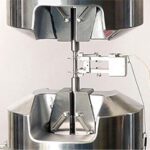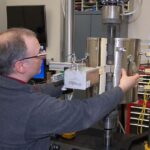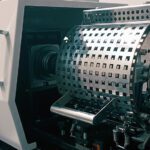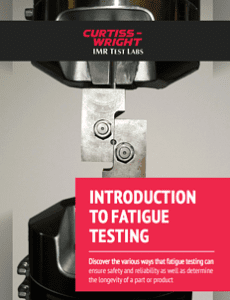Our Mechanical Fatigue Testing Services Laboratories utilize cyclic loading (HCF-LCF) to predict the life of materials under fluctuating loads and temperatures. Determining fatigue life can support research and development efforts for new materials as well as prevent failures and recalls when used to ensure material properties. Understanding a material fatigue life is critical in the markets we serve, a wide range of industries, such as Aerospace Materials and Medical Device Testing, to ensure safety and reliability as well as determine the longevity of a part or product.
Fatigue testing methods help manufacturers evaluate and validate the characteristics of candidate materials. We have various frames designed to handle a wide range of loads and samples.To find out more about IMR's fatigue testing capabilities, request a quote, or click on the button below.
What Types of Materials Can Be Fatigue Tested?
•Metals •Finished Products •Composites •Polymers •Coatings •Non-Metallic/Metal Hybrids
Fatigue Testing Variables
Mechanical fatigue testing services ensure materials are tested properly with several variables to be considered. At IMR Test Labs we can assess the variables and apply them to our testing procedures in order to ensure an accurate and thorough analysis of the materials.
- Static Load vs. Oscillating Forces
- Behaviors and Scenarios of real-world use
- Temperature Exposure - Ambient vs. Thermal
- Fatigue Type - Compression / Tension / Bending
Mechanical Fatigue Testing Methods





AXIAL FATIGUE TESTING
Critical for assessment of how materials behave under conditions mirroring those in structural components like beams and joints, axial fatigue testing applies tensile and compressive loads in cyclical patterns along a material's axis.
Applications: Metals, alloys, and structural materials.
Key Features: Varying cycle counts, custom load profiles, and accurate strain measurement.
HIGH-TEMPERATURE FATIGUE TESTING
Fatigue behaviors can vary in materials exposed to high temperatures. Cyclic loads applied to materials at elevated temperatures in order to assess performance in harsh environments, long term.
Applications: Aerospace components, exhaust systems, turbine blades.
Key Features: Real-time data collection, testing up to 1,200°C, thermal cycling.
ROTATING BEAM FATIGUE TESTING
Ideal for providing insights into a material's endurance limit, rotating beam fatigue testing is the rotation of specimens under cyclic bending stresses. Shafts and other rotating parts experience forces in real-world applications and durability and safety are critical.
Applications: Rotor components, power transmission, and automotive.
Key Features: Crack propagation monitoring, high-frequency cycling, continuous rotation at various speeds.
SHEAR FATIGUE TESTING
Shear fatigue testing predicts failure points when material's subject to repeated shear stress and sideways forces.
Applications: Composites, adhesives, bolted connections.
Key Features: Real-time strain data, multi-axis load application, customizable shear angles.
CRYOGENIC FATIGUE TESTING
Cryogenic fatigue testing is specifically for materials used in extremely low temperatures to ensure that they perform reliably.
Applications: Cyrogenic tanks, spacecraft.
Key Features: Resistance to brittle fracture, temperature-controlled chambers down to -196°C.
FATIGUE TESTING BENEFITS - CRITICAL FOR SAFETY CRITICAL INDUSTRIES
Predicts Material Longevity - Determines how long a material can withstand repeated stress before failure.
Enhances Safety - Helps prevent unexpected failures in critical components, especially in aerospace, automotive, and structural applications.
Optimizes Design - Engineers can refine materials and structures to improve durability and performance.
Ensures Compliance - Meets industry standards (ASTM, ISO) and regulatory requirements.
Reduces Maintenance Costs - Indentifies potential weaknesses early, preventing costly failures and downtime.
Supports Material Selection - Compares different materials to find the best fit for specific applications.
Fatigue testing plays a vital role in ensuring product reliability, especially in industries where failure can have serious consequences. To learn more about fatigue testing for product durability in safety-critical industries, read our blog.
FATIGUE TESTING FAQs
Fatigue testing evaluates how materials perform under repeated stress cycles, helping predict failure points and ensure durability in real-world applications.
Fatigue testing identifies a material's resistance to cyclic stress, preventing unexpected failures in critical applications like aerospace, automotive, and medical devices.
Common types include axial fatigue, high-temperature fatigue, rotating beam fatigue, shear fatigue, and cryogenic fatigue testing, each tailored to specific conditions.
Aerospace, automotive, medical, energy, and manufacturing industries rely on fatigue testing to verify material performance in extreme or repetitive stress environments.
Tests apply cyclic loading to materials at varying temperatures, stress levels, and frequencies to mimic actual operating conditions and assessing long-term durability.
Fatigue testing follows industry standards such as ASTM E466 for axial fatigue and ASTM E606 for strain-controlled fatigue testing, ensuring reliable and comparable results.
Fatigue test duration depends on the material, applied stress, and required number of cycles, ranging from hours to weeks, depending on test parameters.
MECHANICAL FATIGUE TESTING METHODS
Adhesion (Peel) Testing
Bend Testing
Bond Strength Testing
Charpy Impact Testing (-320°F to 450°F)
Climbing Drum Adhesion of Sandwich Composites
Coating Adhesion
Coating Shear Fatigue
Coefficient of Thermal Expansion by TMA
Composite Testing (Fiber Reinforced)
Compression Set
Compressive Properties
Core Shear Properties of Sandwich Construction by Beam Flexure
Creep and Stress Rupture Testing
DMA (Dynamic Mechanical Analyzer)
Ductility
Elastic Modulus
Fatigue Testing
Filled Hole Tension & Compression
Flattening
Flat-wise Tensile Testing
Flexural Properties
Floating Roller Peel Strength
Fracture Mechanics
Gel Time
Hardness (Rockwell, Brinell, Durometer, Shore, Barcol, Knoop, Vickers, Macro Vickers)
Heat Aging
Heat Deflection by TMA
Heat Treatment (furnace to 2100°F)
Hydrogen Embrittlement
Hydrostatic Pressure
Interlaminar Shear
Jominy Hardenability
Lap Shear Testing
Machining & Specimen Preparation
Materialography
Modulus of Rupture (MOR)
n-Value (Strain Hardening Exponent)
Open Hole Tension and Compression
Pipeline Integrity Testing
r-Value (Plastic Strain Ratio)
Residual Strength of Composites After Impact
Rotating Beam Fatigue
Shear Testing of Rivets to ASTM B565, Single/Double
Short Beam Strength
Shot Peen Qualification
Single-Edged Notched beams (SENB)
Slow Strain Rate (G129)
Specimen Conditioning
Strain Gaging
Surface Roughness (ANSI/ASME B46.1)
T Peel Strength
Tear Resistance of Films & Sheeting
Tear - Rubbers & Elastomers
Tensile Testing
Torsional and Axial Fatigue (200 lb)
Tube Testing (Tensile, Flare, Hydrostatic)
Welder & Procedure Qualification
Wire/Spring Testing (Wrap, Coil, Bend)
Young's, Tangent and Chord Modulus (Room Temperature)
RELEVANT ACCREDITATIONS
Click here for a complete list of accreditations and certifications for all IMR Test Labs locations.
DOWNLOAD THE FATIGUE TESTING EBOOK
Fatigue Testing Overview
Fatigue Testing Capabilities
IMR Test Labs Expertise

Mechanical Fatigue Testing FAQ's
Q) How long does Mechanical Fatigue Testing take?
A) The time it takes to perform a Mechanical Fatigue test can vary however in most instances the test can be completed in 3 days to a week (longer times required for more complex, multi-departmental testing requests).
Q) What kind of fatigue testing is performed on my materials?
A) The type Mechanical Fatigue Test that is performed on your materials is determined by the assessment of several factors, including the application of use, the environmental exposures and estimated life expectancy of the material.
Q) Can fatigue testing be done at all of your facility locations?
A) Mechanical Fatigue Testing can be performed at our Ithaca, NY and Suzhou, China locations. See a complete list of IMR Test Labs Locations and their service offerings.
Q) Can IMR test to ASTM Mechanical Fatigue Testing standards?
A) There are a myriad of ASTM testing methods that IMR performs. Contact us with your testing needs at 888-464-8422 to talk with our experts or contact us by email.
Q) How much does Mechanical Fatigue Testing cost?
A) The price of Mechanical Fatigue Testing can vary depending on several factors. There are discounts available for long-term testing arrangements, and premiums charged for expedited testing. For more information, you can reach a testing expert at 888-464-8422 or request a quote.
Q) What type of analysis report is provided after a Fatigue Test?
A) A thorough detail of the data generated by testing, graphs and pictures where required, and analysis of the failure mechanism. Click here for a sample Mechanical Failure Analysis Report PDF
Q) How accurate are Mechanical Fatigue Testing results?
A) IMR Test Labs provides highly accurate results that are cross-checked and approved prior to submission to the customer.


